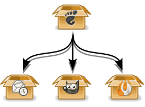Using a gamepad under GNU/Linux
Classified in : Homepage, Debian, Miscellaneous

I have just bought a gamepad, the Saitek V.3 Cyborg Rumble Pad (also marketed as PS2700), mainly to play at SuperTuxKart under Debian GNU/Linux.
It works perfectly, except for one minor feature, and it can be used for playing and as an X11 input device.
Wrapper to use su as sudo (or sudo as su)
Classified in : Homepage, Debian, Command line
The problem

Some programs require root privileges for part of their work: most notably Debian building tools such as dpkg-buildpackage or pdebuild. So, several command can be used to obtain real or fake root privileges: su, sudo, fakeroot, etc. Among them, su is quite distinct, because it only takes a quoted command to pass it to a shell. That is why its interface is completely incompatible with the others':
$ su -c "pbuilder --build package.dsc" $ sudo pbuild --build package.dsc
This is annoying when real root privileges are needed, for instance by pbuilder, a tool to build Debian packages inside a minimal chroot. Indeed, in such a case I only know one command to obtain the root privileges, sudo, and some people (read: me) prefer using su.
Uninstalling a single component of a meta-package
Classified in : Homepage, Debian, Command line, To remember
Or how to get rid of Evolution without removing your whole system

There is a complain I have heard several times from people after they installed Debian: “I use Icedove/Thunderbird so I do not need Evolution: I tried to remove it but this would remove my whole system, that sucks!”
Sonar, un écran de veille qui pingue
Sonar

Parmi les nombreux écrans de veille fournis avec XScreenSaver, sonar(6) affiche en 3D une simulation d'écran de sonar au phosphore. Par défaut, il affiche les positions de quatre MIG et quatre F18. Comme tous les écrans de veille XScreenSaver, il peut être lancé :
- en tant qu'écran de veille ;
- à la main dans une fenêtre :
/usr/lib/xscreensaver/sonar; - à la main sur le bureau, pour impressionner la galerie :
/usr/lib/xscreensaver/sonar -root.
About system host names
Classified in : Homepage, Debian, Miscellaneous, To remember
The host name
On Unix systems, the host name is kept in memory by the kernel: it is set
and get by the sethostname() and gethostname()
functions and their command-line wrapper hostname(1). It can be
used by several programs, for instance by the mail server to determine what it
should use as its HELO name.
In fact, the host name has two forms: the short one and the fully qualified one. For instance, a host can have muscadet as its short name muscadet and muscadet.example.com as its fully qualified one. From these two forms, a third information can be deduced: the domain name, which is the full name without its first component.
The system host name can be set as either the short name or the fully qualified name. When the full name is used, the short one can be easily deduced, by keeping only its first component. When the short name is used, the full name must be determined by using a more complex heuristic that takes more time and can fail for several reasons.